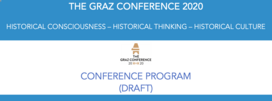VII – The impact of the digital revolution on the core concepts of history didactics/ historical education
Innovative forms of communication, interaction and media provide multiple opportunities today for historical learning in classroom, university courses, virtual museums, distance learning and beyond.
The digitalization of academic work (ejournals, ebooks, open access publications; visualization, recording and performances of scientific information) has opened the global ‘market’ for sales and distribution of academic products in unexpected dimensions. The internet provides a dynamic space of community-building, self-representation and self-reference also in the academic world. Beyond the academic system, the digital revolution has created new possibilities in the educational and the cultural systems.
Historical cultures have changed over the past thirty years. Performances of historical narratives, such as film, TV, and especially computer games provoke new relations and thus new perspectives on the idea of ‘historical consciousness’, ‘historical thinking’ and ‘historical culture’.
In addition, beyond the obvious changes in the access to and the multiple forms of sources and narratives, the concept of ‘historical consciousness’ might be questioned in its epistemological bases when regarding the ‘habitus’ and the emotional ‘flow’ of the players involved in historical computer games or the stressing communication in the clouds of ‘social media-culture’ and in consequence request additional analysis and in-depth theoretical reflection.
Empirical research on the impact of the auditive and visual communications of narratives on ‘historical sense-making’ of the ‘social subject(s)’ and/or the various social (sub-) systems are just at the beginning of scientific debate and reflection. The questions, whether the ‘visualization’ and/or staging of historical information contributes to the creation of formerly unknown structures of ‘historical consciousness’, or whether the ‘hypertext’ engenders new forms of ‘historical thinking’ (or of historical learning) demand additional debate and – more than that – request efforts of empirical research.
Presentations/ respondents might therefore also discuss questions such as:
- In which aspects/dimensions is the concept of ‘historical consciousness’ challenged by developments in the digital age (historical sense-making; narratology; contribution/irritation of identity-building, …)?
- Which aspects of the ‘historical thinking’ concept might be questioned/challenged in view of developments in the digital age (e.g. significance; evidence; cause and consequence; …)? How about challenges for other conceptions of ‘historical thinking’ (e.g. esthetics, logics, functions…)?
- What forms of ‘historical culture’, (forms through which historical consciousness is expressed), should be discerned for the discourse on history didactics in the digital age: e.g. (textual, oral and graphic) narratives, historiography, staging and installations in museum exhibitions, performances and orchestrations via internet and social media, strategic/organizational structures of computer games, …?
Conference Office
Alois Ecker
Institute of History
Heinrichstraße 26/II
8010 Graz
Institute of History
Heinrichstraße 26/II
8010 Graz
Benjamin Ecker
Institute of History
Heinrichstraße 26/II
8010 Graz
CONFERENCE OFFICE
grazconference2020(at)uni-graz.at
+43 699 19221739
Bettina Paireder
Alois Ecker
Benjamin Ecker



